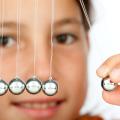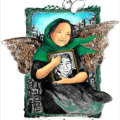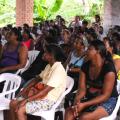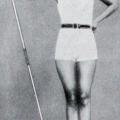Archive
2012

Gender equality reduces violence
Gender equality in the family reduces the risk of violence by two-thirds. This is according to a new European study.

Wanted: More of the idealistic physicists
Physics has a reputation as being only for the stereotypical nerds. According to science education researcher Maria Vetleseter Bøe, that is unfortunate both for the field and for everyone who misses out on the chance to find out how much fun physics is.

Antidote to anti-feminism
According to Norwegian terrorist Anders Behring Breivik’s manifesto, the second wave of feminism that began in the 1970s has been a “protest against nothing” because there is no longer any real oppression of women. Senior Researcher Cathrine Holst refutes his claim.

The invisible child soldiers
In DR Congo, 30 to 40 percent of the child soldiers are girls. They experience more sexual abuse and stigmatization and they receive less help than the boy soldiers. In spite of this, the girls get far less attention from the international community.

Women conquer private business
The Norwegian gender quota law requiring that the boards of public limited companies consist of at least 40 percent women caused both excitement and indignation. Now it is being copied in many European countries.

Why women choose ICT
“It’s about time that we explore what includes women in the ICT field and stop focusing on what excludes them,” says Knut Holtan Sørensen, who recently published a book on the topic.

Remember gender when crisis strikes
Women and men, boys and girls may have different needs and personal resources in a crisis situation. But how easy is it for humanitarian aid workers to remember this when they are surrounded by people in crisis?

Men soften with age
“Dirty old men” or asexual seniors? Research on sexuality and old age paves the way for a new view of masculinity.

Hit by the baby blues
Many Norwegian women postpone pregnancy until they have completed their education and are well established on their career path. This may make them more vulnerable to postpartum depression.

Hit by the baby blues
Many Norwegian women postpone pregnancy until they have completed their education and are well established on their career path. This may make them more vulnerable to postpartum depression.

Martyrs on Facebook
Can a woman be a genuine martyr? Is it a compliment to say to a woman that she is “equal to a thousand men”? Feminist activists in Iran are waging an ideological war on Facebook.

Norse gods in a crusade for Europe
Anders Behring Breivik, the Norwegian terrorist, called the gun he used to carry out the killings "Mjolner", named after the norse god Thor's hammer. He also claims to be an "Odinist". According to theology professor Jone Salomonsen, neopaganism is usually associated with New Age spirituality and the left wing, but right-wing extremists also draw on pre-Christian religion to build alternative power.

Dreams of a welfare state
Women in Southern Europe wish they could live under a Nordic-style welfare state so they could improve their lives as women. But the financial crisis has made their dreams less realistic than ever. This is according to John Eriksen, a researcher at the Norwegian Social Research Institute and the co-editor of a new book on women’s lives in Europe.

Beaten by their wives
Violence is neither a women’s problem nor a men’s problem. According to Professor Tove Ingebjørg Fjell at the University of Bergen, it is a human problem. She conducts research on men who are physically abused by their intimate partners.

Gender segregated business ownership
According to researchers, gender differences in education and employment is one reason why it is so difficult to achieve the Norwegian Government’s target of 40 percent female business owners by 2013.
2011

Sociology: low-status and a women's field
According to the science hierarchy, sociology has low status whereas mathematics has high status. Both this hierarchy and the peer-review process have characteristics that structurally downgrade women’s position in academia.

How Norwegian must minority politicians be?
Minorities must be “sufficiently Norwegian” and “understand the Norwegian mindset” if they want to run for local political office. Not least, they need to show that they support gender equality. Are minority women judged differently than minority men? Yes, according to sociologist Beret Bråten.

Onward Christian soldiers
In the 1800s, Norwegian missionaries had to strike a balance between Christian virtues and the new, modern man’s role. The solution was to be meek before God and mighty before men.

Unwise argumentation for women peacekeepers?
“Women are peace-loving.” “Women are problem-solvers.” “Women are more empathetic than men.” Arguments such as these are often used to advocate for women’s participation in military operations. This is a risky road to go down, according to researcher Kathleen Jennings.

Booty shake or guitar riff?
Pupils in a lower secondary school in Norway are doing group work. In one classroom, a group of 14-year-olds sit quietly and concentrate, working earnestly on the assignment. In another classroom, the pupils play and fool around with lots of physical activity and very little focused effort. So you think it’s easy to figure out which group consists of boys? Not when it’s music class.

The free prisoners
If we believe criminologist Thomas Ugelvik, Norwegian prisons are filled with freedom. Through relentless entrepreneurship the inmates are able to fool the system and reclaim their manhood.

Ban on the purchase of sex has changed attitudes
The Norwegian ban on the purchase of sex was intended to reduce human trafficking and to convince people that prostitution is wrong. But has it worked? Both yes and no - according to researcher Andreas Kotsadam.

“Ideals of purity create misogyny”
The disciplining and control of women and the feminine are intimately related to notions of cultural and racial purity. As a result, racist ideologies are almost always also misogynist and anti-feminist, says British philosopher Jane Clare Jones. She has analysed anti-feminism in the manifesto of Norwegian terrorist Anders Behring Breivik.

The price of justice
Internally displaced women in Colombia are organizing themselves to secure their rights to housing, education and health care. But along with this come threats, violence and dissatisfied husbands. Is it worth it?

The downside of state support
Does state support for voluntary organisations curtail creativity and force activists to focus on what the government wants them to?

After the heat of the battle
Gays and lesbians can now marry or register as partners in all the Nordic countries, with the exception of the Faroe Islands. Yet even within the gay movement there has been a long-standing resistance to marriage for same-sex couples.

Being scrawny is not an option
A dedicated football player, a disciplined martial arts practitioner or a respected weightlifter? According to a recent Norwegian study, young girls are most concerned with their appearance as they become teenagers, but boys must do something to become young men. Their choice of activity is also a choice of masculine identity.

Portrait: Sex is the keyword
A book on a shelf at the university bookstore in Lund was the start of a research career for Karin Widerberg, Professor of Sociology at the University of Oslo.

Muscles and medicine
According to doctors during the interwar period, wide hips made women unsuitable for running long distances. In her recent doctoral thesis, Kerstin Bornholdt looks at how researchers reached conclusions like this.

It's not cool to whine
Young Norwegian women today want to be self-confident, cool and relaxed – as well as pretty and well-dressed. This is the female ideal they find in the magazines they read.